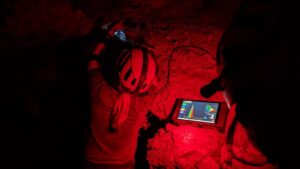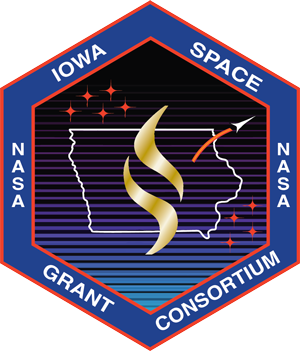 In the scope of astrobiology, the exploration for life within the Solar System is ongoing. Planetary caves are a possible environment that may be habitable for life on other planets and moons. Planetary features may also provide evidence of the presence of life-sustaining materials within the Solar System. The icy moons of Europa and Enceladus have interstitial lakes which harbor organics. Titan’s methane cycle may carve out karstic features in organically rich dunes. Calcite found on Mars is evidence of ancient water once existing in the area. In order to understand how life may be sustained on other planets, extreme environments on Earth must first be explored. In 2023, the University of Northern Iowa astrobiological underground team and I spent more than 80 hours underground doing cave research at Wind Cave National Park. Wind Cave offers a unique opportunity to examine planetary analogs in an isolated environment with limited contaminants. Zebra calcites are evidence of ancient water that helped to form the cave and are used as an analog to Mars. Currently forming flowstone preserves a record of organics from the surface and is analogous to Titan, Europa, and Enceladus. Using UV spectroscopy, further examination of cave formations can be analyzed to determine composition and formation of speleothems. The overall objective of my project is to study analog areas in the cave to which resemble our Solar System to determine the minimal conditions to sustain life. Comparing Wind Cave analogs to features throughout the Solar System, expands our understanding of where life might exist outside of Earth.
In the scope of astrobiology, the exploration for life within the Solar System is ongoing. Planetary caves are a possible environment that may be habitable for life on other planets and moons. Planetary features may also provide evidence of the presence of life-sustaining materials within the Solar System. The icy moons of Europa and Enceladus have interstitial lakes which harbor organics. Titan’s methane cycle may carve out karstic features in organically rich dunes. Calcite found on Mars is evidence of ancient water once existing in the area. In order to understand how life may be sustained on other planets, extreme environments on Earth must first be explored. In 2023, the University of Northern Iowa astrobiological underground team and I spent more than 80 hours underground doing cave research at Wind Cave National Park. Wind Cave offers a unique opportunity to examine planetary analogs in an isolated environment with limited contaminants. Zebra calcites are evidence of ancient water that helped to form the cave and are used as an analog to Mars. Currently forming flowstone preserves a record of organics from the surface and is analogous to Titan, Europa, and Enceladus. Using UV spectroscopy, further examination of cave formations can be analyzed to determine composition and formation of speleothems. The overall objective of my project is to study analog areas in the cave to which resemble our Solar System to determine the minimal conditions to sustain life. Comparing Wind Cave analogs to features throughout the Solar System, expands our understanding of where life might exist outside of Earth.
Jacqueline Heggen – University of Northern Iowa
Student: Jacqueline Heggen, Undergraduate Student in Biochemistry and Biology, University of Northern Iowa
Research Mentor: Dr. Joshua Sebree

Entrance to Entrance: A Hunt for Astrobiological Analog Sites at Wind Cave
2023-2024, Undergraduate
